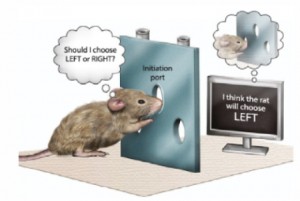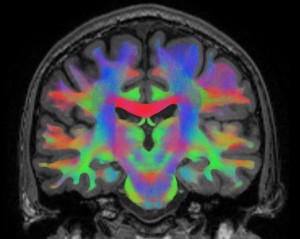Do you ever feel as though despite your experiences, you repeatedly make the same mistake? Most of the time, we center our decisions on logic and prior experience. But… can we ever get the best outcome by simply making a random choice and ignoring what we already know?
(Click here for an awesome article about how our brain helps our reasoning and decision-making!)

Rats were monitored by a computer that tried to predict the rat’s decisions. Image Source: Howard Hughes Medical Institute (HHMI)
In a study recently published in Cell, scientists from Howard Hughes Medical Institute (HHMI) found that when faced with a challenging “opponent”, rats stopped using strategy to make decisions and made decisions randomly instead. In the experiment, rats were presented with two holes in a wall, one of which contained a sugary reward. Meanwhile, the rats were monitored by a computer-simulated opponent, which recorded the rats’ past choices so as to predict its future choices. To get the sugar, the rats had to choose the hole that was not predicted by the opponent. When faced with opponents that made weak predictions, the rats selected holes using strategy. However, when the computers used complex algorithms to predict the rats’ choices, the rats instead selected holes at random!
Are there advantages for animals to change behaviour from using logic to choosing randomly? Firstly, when animals encounter situations that are unpredictable in the wild, such as predators or prey that move erratically, it could be beneficial to move randomly to evade predation or capture prey. Moreover, random behaviour might be useful in the exploration of new environments. For example, a rat might find food in a place that it would not explore if it were making decisions based on past experience gained in a different environment.
The scientists from HHMI discovered that when the rats faced hard-to-beat opponents, the amount of a stress hormone (norepinephrine) increased in the rat’s brain. Furthermore, the rats continued to act randomly even after the opponent started to make weak predictions again! To free the rats from this state, the scientists suppressed the release of the stress hormone, causing rats to return to their strategic decision-making.

Further research into the role of hormones in the brain on decision-making may lead to novel treatments foe mental conditions. Image source: Flickr commons; Uploader: European Space Agency
This study may be a step in the right direction of developing a treatment for “learned helplessness” in people. Learned helplessness is a mental condition in which an individual becomes unwilling to avoid painful situations because they believe that they cannot control the outcome. The actions of people suffering from this disorder resemble that of the rats stuck in “random mode”, as their decision-making is impaired. Perhaps a treatment can be found in the near future for learned helplessness and other conditions, such as depression, with further research investigating the brain’s function in decision-making.
In the video below, uploaded to YouTube by LennyBound, an Oxford math professor participates in an experiment that aims to explain the brain’s role in decision-making:

-Imran Mitha

